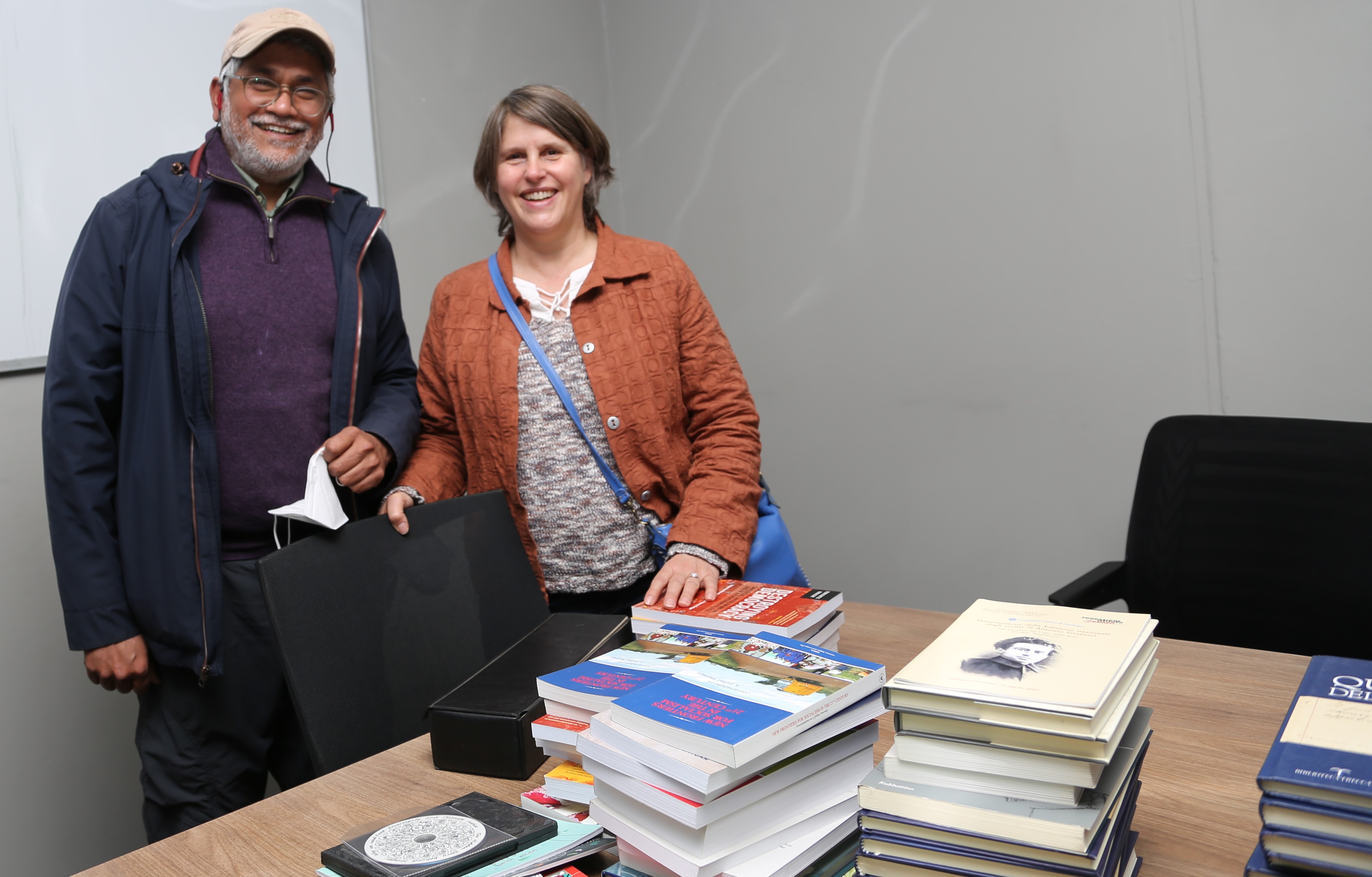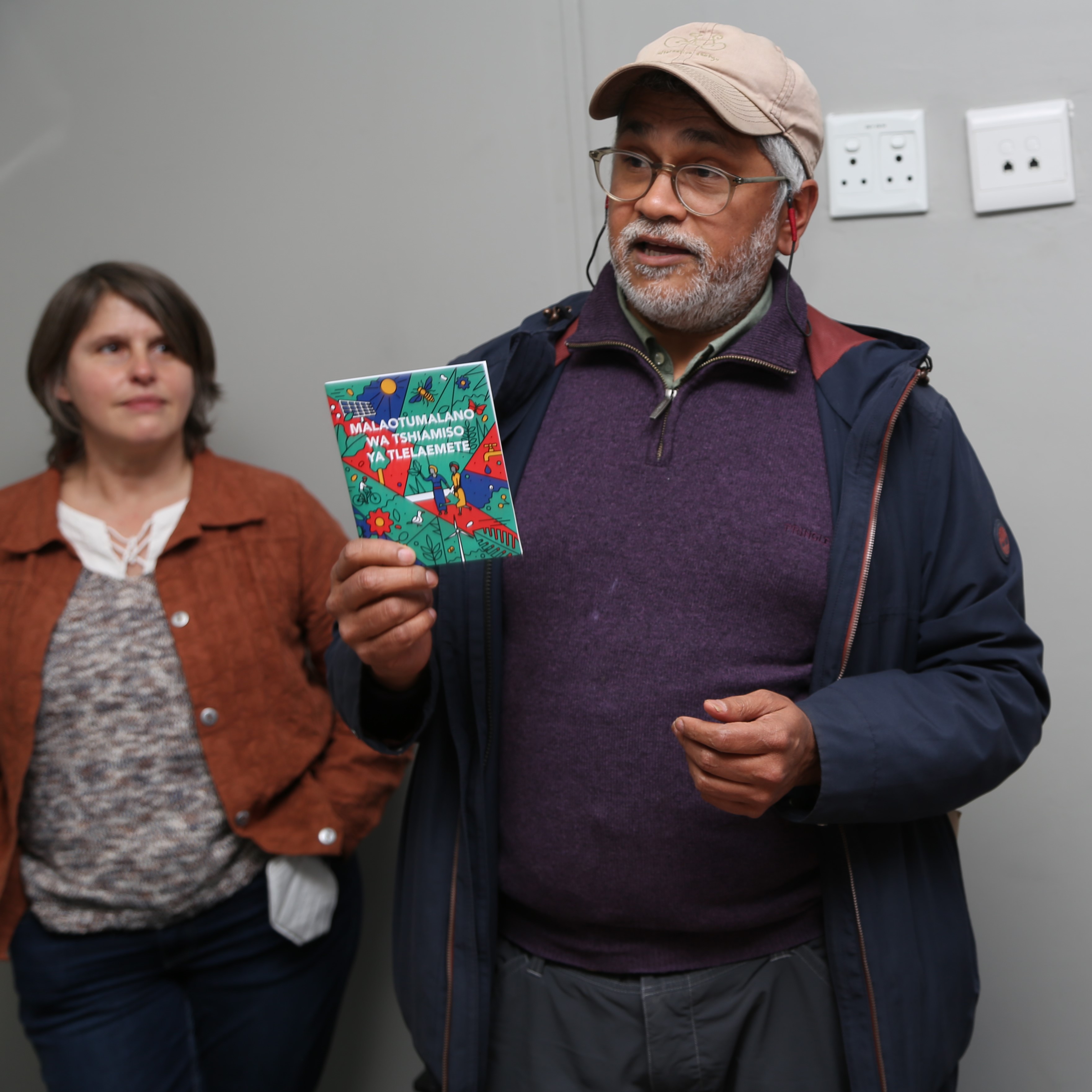by Vishwas Satgar and Michelle Williams
Vishwas Satgar is an Associate Professor of International Relations at the University of the Witwatersrand (Wits)
Michelle Williams is a Professor of Sociology at the University of the Witwatersrand (Wits)

Vishwas Satgar and Michelle Williams donating books to UCT
The books that make up the Satgar-Williams Special Collection at UCT were collected over 30 years and stem back to our early undergraduate studies. Both of us had a keen interest in progressive and in particular Marxist thought stemming from our firm commitment to transformative politics. We saw in Marxism and many progressive left traditions both the political compass as well as the intellectual tools for thinking about alternatives for the future in which human and non-human flourishing are central to the organisation of economies and societies. The collection therefore includes some very rare and out-of-print books from the left tradition, including a copy of Gramsci’s handwritten prison notes (18 volumes), which the Gramsci Institute in Rome gifted Vishwas on a visit to them. The Gramsci Institute only produced a very limited number of copies and we were extremely honoured to receive one full set, which according to them is the only set on the African continent. One of the unique aspects of our collection is the international range from African, South American, Western and Eastern left/progressive thought as well as a significant number of books on climate crisis, ecological issues, feminism, eco-socialism, humanism, philosophy, culture, and futures studies. The collection includes a large number of books on India, especially Kerala India, and the Communist Party of India (Marxist), reflecting Michelle’s PhD focus on the communist parties’ democratic transitions in South Africa and Kerala, India. Only a PhD student would invest in the 23 volumes of the CPI(M)’s documents and the entire collection of African Communist!

The Satgar-Williams Special Collection
A bit of personal history, Michelle and Vish met in 2001 when Michelle was beginning her PhD research and Vish was the Gauteng Provincial Secretary of the SACP and also beginning his PhD studies. What is very bizarre about our trajectory was that we were both doing PhD’s comparing the communist parties in South Africa and India (Vish was further including Brazil). We came to this idiosyncratic topic sitting across the world from each other (Michelle at the University of California, Berkeley and Vish at Wits University in Johannesburg), without knowing each other, from very different backgrounds, and totally different locations. Vish an insider in the history of struggle as a fifth generation South African and an activist and leader in the SACP; Michelle an outsider to the movement, born and raised in California, and coming at the project from an academic perspective. Yet, we were both drawn to the same questions, particularly the relationship of left parties to democracy, looked to the same regions of the world (notably the Global South), and sought inspiration from the same intellectual and political traditions. Therefore our collection reflects this very eclectic and geographically diverse interests. (The fact that Michelle was studying the same topic led Vish to change topics and study Africa’s political economy.)
The collection is deeply connected to our intellectual and political journeys over the past 30 years. Vish worked for the National Labour and Economic Development Institute in the 1990s, COSATU’s think tank, on labour law reform. His personal book collection grew with literature on South Africa’s political economy, labour law and trade union politics. Vish joined the SACP in the early 1990s, inspired by the commitment of the SACP to rethink its socialism beyond the Soviet Marxist-Leninist frame. In contributing to the renewal of the SACP’s Marxism, as ‘Our Marxism’, and doing national political education, he built up an extensive collection of Marxist and radical literature. His passion to strengthen a democratic imaginary in the SACP also informed his role as Gauteng secretary of the SACP (2001-2007). One of his joint research projects in the SACP was interviewing leading left thinkers and parties in different parts of the world about the prospects of left alternatives and the future of socialism in the 21st century. This produced an important set of interviews contained in the book New Frontiers for Socialism – Conversations on a Global Journey. This book affirmed the importance of post-Stalinist Marxisms in the world and the flourishing of new anti-capitalist thought. Even after being expelled from the SACP in 2009 for standing against Zumafication, Vish continued the project of renewing socialism as democratic eco-socialism through the Democratic Marxism (DM) series published by Wits University Press. Today, the seven volumes of the DM series are leading examples of conjunctural analysis and decolonial Marxism. All seven volumes are Open Access, freely downloadable anywhere in the world, further demonstrating our commitment to sharing knowledge as widely as possible. Many of the books in our collection contributed to renewing democratic socialist thought in the SACP and the Democratic Marxism series.

Vishwas Satgar holding up a book and Michelle Williams
In studying how Africa was globalised for his PhD, Vish’s personal collection gathered a treasure trove of African thought on Pan-Africanism, African history, African alternatives to structural adjustment, African socialism, development and regionalisation. This includes the most extensive collection of books written by Africa’s leading Marxists such as Frantz Fanon, Claude Ake and Samir Amin. Vish’s activist work through the Cooperative and Policy Alternative Centre (1999 – 2009), as co-founder and director, also yielded crucial book additions on cooperatives, local development, ecology, popular education, feminism and culture. As a leading thinker on the solidarity economy in South Africa, co-founder of the South African Food Sovereignty Campaign and the Climate Justice Charter Movement, this collection includes one of the most comprehensive collections on cooperatives, food systems and indigenous thought, environmental justice and climate politics. The climate crisis has continued to occupy Vish as a critical scholar at Wits and his Mellon Project on Emancipatory Futures Studies in the Anthropocene has widened his transdisciplinary research interests, including how to rethink the humanities and social sciences to address the worsening climate crisis. This collection contains several books relevant to this endeavour. At Wits University Vish has also taught South African foreign policy, US foreign policy, International Development and a course on Empire and the Crisis of Civilisation. This collection contains many books reflecting these themes.
Michelle’s intellectual itinerary contrasts markedly from Vish’s yet she also found herself asking many of the same questions and looking to similar intellectual traditions. As a PhD student at UC Berkeley, Michelle had three areas of specialisation—development, sociological theory (combined with political theory), and psychoanalysis (what she called psychoanalytic sociology)—reflecting the influence of her mentors at Berkeley, namely Michael Burawoy, Peter Evans, Nancy Chodorow, Raka Ray and Michael Watts. The collection reflects this intellectual journey with a wide range of object relations psychoanalytic books, historical sociology, development, philosophy and political theory and Marxist-inspired scholarship. After completing her PhD, Michelle moved to South Africa to be with Vish and got her dream job in sociology at Wits University.
Once settled at Wits, she turned her PhD into a book, The Roots of Participatory Democracy, and expanded her interests to look more explicitly at democracy, emancipatory alternatives, ecology, labour and gender/feminist studies. Her interest in democracy informed her co-edited volume (with Vish) Destroying Democracy, which highlights the ways in which democracy is eroded through neoliberal capitalism,while her engagement with Marxism’s chequered history is explored in the co-edited volume (with Vish) Marxisms in the 21st Century. Motivating her research on democracy is a deep appreciation for the importance of participatory and representative forms of democracy, which is further explored in articles on Kerala and its democratic decentralisation experience. Turning more explicitly to economic democracy, her co-authored book, Building Alternatives: the Story of India’s Oldest Construction Cooperative traces the ninety-year history of the cooperative. Her interest in democracy also inspired work on women’s political participation in which she looked at Ivory Park Township and rural villages of Keiskammahoek. These interests have led her to collect a large range of work on the state, democracy, and alternatives.
The other key themes coursing through her work are new ways of thinking about development and the developmental state. This interest resulted in her edited volume, “The End of the Developmental State?”, which challenges the field by showing that the twentieth century manufacturing-led industrialisation as a harbinger of growth and development is no longer with us, and four pivotal conditions—an economy based on services and high-technology, democratic politics, epistemic shifts in in our understanding of development, and ecological limits—compel would-be developmental states of the twenty-first century to revise their goals and strategies. As the chairperson of the Global Labour University (GLU) and the International Centre for Development and Decent Work at Wits for ten years, Michelle also developed a keen interest in labour studies, reflected in her co-edited (with Jennifer Jihye Chun) special issue looking at “Labour as a Democratizing Force in South Africa and Beyond?” and the co-edited book (with Sarah Mosoetsa) on Labour in the Global South, which brought to the fore the emerging field of global labour studies. Michelle’s work comparing South Africa and India has contributed to the recent field of Indian Ocean studies and informed a special issue of the Journal of Asian and Africa Studies and the edited volume South Africa and India: Shaping the Global South (Wits Press) that she co-edited with Isabel Hofmeyr. All of these areas of interest have led to a book collection that is varied in its geographical reach, intellectual traditions, and areas of specialisation.

Close up of some books in the Satgar-Williams Special Collection
Combining our collections into the Satgar-Williams Special Collection results in an expansive and diverse collection, yet the thread that runs through the entire collection is critical thought, reflecting our firm commitment to finding more just, happier, ecological, healthy, culturally rich and peaceful futures for human and non-human nature. We’ve loved having our extensive left book collections. We’ve written many books, edited volumes and articles drawing on and in dialogue with the books in our collection. Over the years, our collection has grown into one of the most extensive left/progressive book collections in South Africa, growing into approximately 6000 books. These books are becoming rare given the shift to digitisation. Under apartheid such a collection would have been banned or led to our incarceration.
Because of its unique reach and vastness, we decided that our collection should be housed in a university library in order to be available to the next generation of scholars, students, activists, and movements. We were deciding between Wits (where we both work and where the Vishwas Satgar Historical Papers are based) and UCT (where Vish did his MA in Labour Law and Michelle did a great deal of research in the archives) when the tragic fire burned UCT’s iconic Jagger library in 2021, destroying some of the African collection. It was this event that led us to approach UCT to see if they would be interested in our collection. We were extremely happy with the enthusiastic response from the UCT library. Over time, we will donate our entire collection to UCT and would like to extend our gratitude to the special collections team (in particular Mandy Noble), the archivists (in particular Michal Singer), and the entire library staff (in particular Ujala Satgoor, Executive Director and Nikki Crowster, Director) for their work in maintaining one of South Africa’s best and most precious library systems. There is no better place for our collection.

From left to right: Michal Singer, Mandy Noble, Michelle Williams, Vishwas Satgar, Ujala Satgoor and Nikki Crowster
All photographs courtesy of Theresa Schoeman © UCT Libraries
